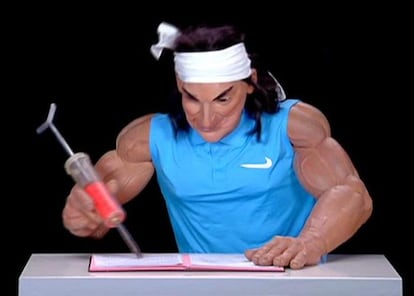Satire as a matter of state
Spain and France at loggerheads over television puppet-show doping jibes

What began as a simple jibe on French television toward Spanish sport following the two-year doping ban handed to Alberto Contador by the Court of Arbitration for Sport has blown up into a diplomatic row between the countries with public figures on both sides of the Pyrenees weighing in.
The spat began earlier this week when a satirical puppet show aired on Canal+ France ran a series of sketches depicting, among other things: Rafael Nadal urinating into the gas tank of his car, which then speeds off into the distance; members of the French public donating their blood to Contador; and Iker Casillas, a Spanish basketball player and Nadal writing their support for Contador with syringes.
The minister for foreign affairs, José Manuel García-Margallo confirmed that a letter had been sent to the French Sports Minister David Douillet by the Superior Sports Council (CSD) expressing "extreme preoccupation" over the denigration of Spanish sport.
"Spanish athletes are an important element of the group of assets that form the Spanish brand at the service of the country's image," said García-Margallo in Madrid with the European commissioner for the Internal Market, Frenchman Michel Barnier. In his hands García-Margallo clutched a riposte: in 2011, he said, there were 171 cases of doping in Spain compared to 233 in France. The Spanish Embassy in Paris also sent a letter to Canal+ and various media railing against the "serious offense to the ethics" of Spanish sport.
But the backlash did not deter the show, Les Guignols de l'info, from renewing its assault on Thursday evening. Apologizing for causing any offense, the show ran a story about the recent discovery of a Mona Lisa copy in Madrid's Prado, showing the Louvre original and the copy - with bulging biceps. Then Nadal, Contador and Casillas were seen singing Viva España and alluding to having a fridge full of blood bags.
"We have always done the same thing," said the show's press officer, Pascal Aznar. "We are like the loutish kid in the back of the class, adding a pinch of salt to reality. If the same thing had happened to a German cyclist, or an American, we would have done the same. If we used Nadal it's because he is the only puppet of a Spanish athlete we've got."
The scriptwriters, said Aznar, "know very well that Spanish sport is the best in the world but it's not envy, quite the reverse, we admire it. We love sport but that hasn't stopped us making fun of [French sports stars] Amélie Mauresmo, or Richard Virenque."
The subjects of the sketches met them with mixed reactions. Pau Gasol spoke of an attempt to "stain the image of Spanish sport," while Casillas' teammate Esteban Granero called it "envy and bad taste." Nadal took the jibes with a shrug. "At the end of the day it is humor. When it's one day it's OK but when, from what I understand, it is done repeatedly then that is not so good because it crosses the line a bit. The institutions in general have to defend us because I don't think it is a campaign against me or a campaign against anyone. It is a campaign against Spain in general, and against Spanish sports. I believe in Contador and in all Spanish athletes."
Socialist leader Alfredo Pérez Rubalcaba poked fun at the neighboring country: "The French summer is very bad. We have Roland Garros, the Tour, and then there's the soccer..."
The Spanish Tennis Federation said on Thursday that it intends to sue Canal+ France over the sketches while the CSD responded by promising to adopt "measures to impede the sowing of doubt over the integrity of Spanish sport." The minister for culture, education and sport, José Ignacio Wert, promised the creation of a new anti-doping law within the next two months.
Tu suscripción se está usando en otro dispositivo
¿Quieres añadir otro usuario a tu suscripción?
Si continúas leyendo en este dispositivo, no se podrá leer en el otro.
FlechaTu suscripción se está usando en otro dispositivo y solo puedes acceder a EL PAÍS desde un dispositivo a la vez.
Si quieres compartir tu cuenta, cambia tu suscripción a la modalidad Premium, así podrás añadir otro usuario. Cada uno accederá con su propia cuenta de email, lo que os permitirá personalizar vuestra experiencia en EL PAÍS.
¿Tienes una suscripción de empresa? Accede aquí para contratar más cuentas.
En el caso de no saber quién está usando tu cuenta, te recomendamos cambiar tu contraseña aquí.
Si decides continuar compartiendo tu cuenta, este mensaje se mostrará en tu dispositivo y en el de la otra persona que está usando tu cuenta de forma indefinida, afectando a tu experiencia de lectura. Puedes consultar aquí los términos y condiciones de la suscripción digital.








































